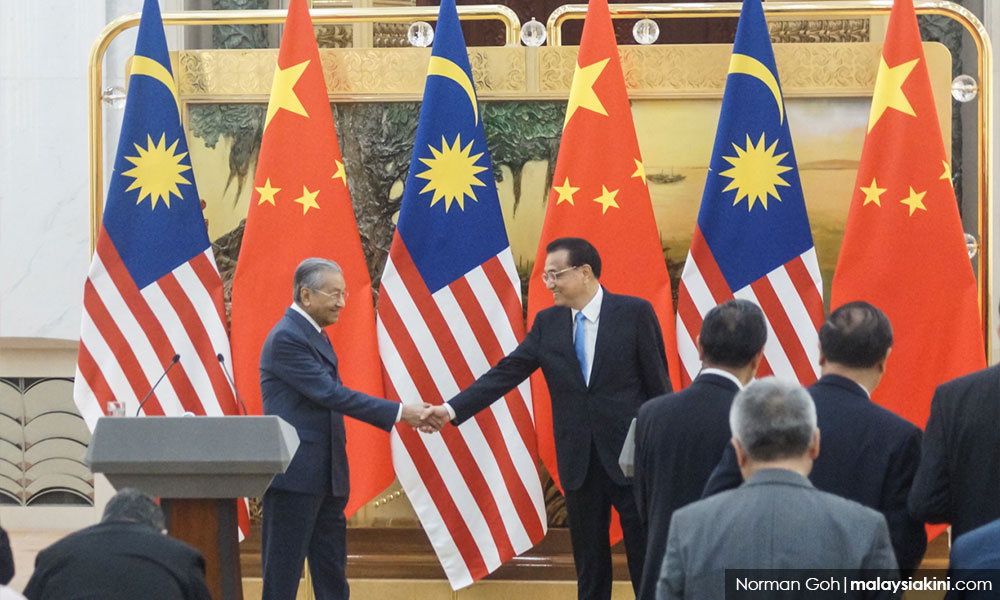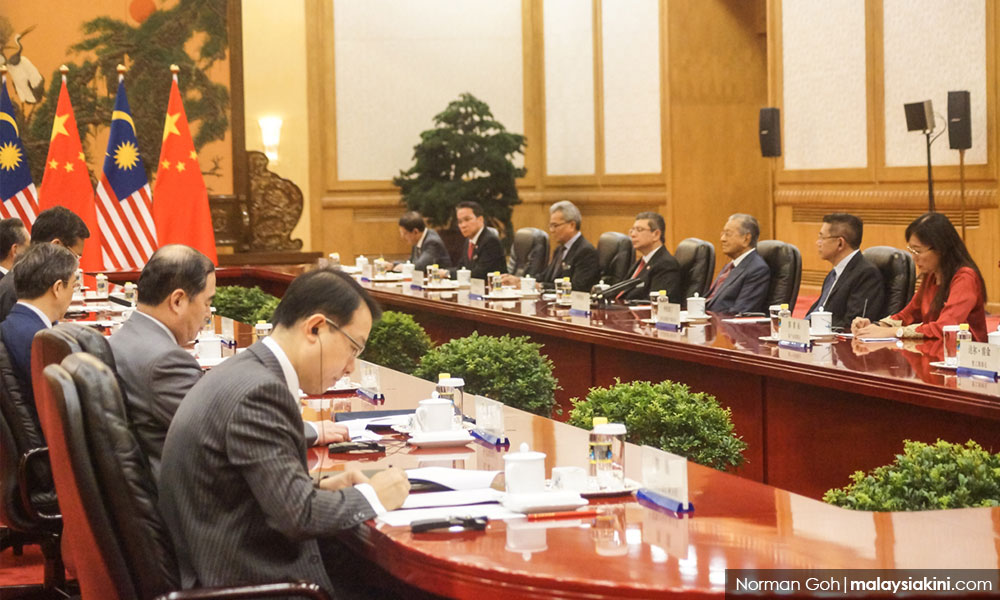COMMENT | After Dr Mahathir Mohamad became the prime minister of Malaysia for his second time, he visited China on Aug 17. Although this was his eighth visit to China, his five-day trip attracted widespread attention.
Opinions are divided on this China trip. Some are even exaggerated, describing Mahathir’s trip as a historic milestone or starting a new chapter in bilateral relations. On the other hand, negative views portrayed the trip as a diplomatic disaster.
The main intention of Mahathir’s China trip was quite obvious – he was not going for more economic and trade cooperation with China, but to indicate clearly that Malaysia was going to scrap the infrastructure development projects signed by the previous BN government.
These included the East Coast Rail Link (ECRL) and the two pipeline projects under Suria Strategic Energy Resources (SSER), the Multi-Product Pipeline (MPP) in Malacca and the Trans-Sabah Gas Pipeline (TSGP) in Sabah.
Before visiting China, Mahathir had stressed repeatedly that he wanted to cancel investment megaprojects signed by former prime minister Najib Abdul Razak in order to reduce the national debt. At the same time, it was also stated clearly in the Pakatan Harapan’s election manifesto that it was necessary to review Chinese investment projects.
Mahathir had also sent Council of Eminent Persons (CEP) chair Daim Zainuddin to the country for negotiations with China. Even state councillor cum minister of foreign affairs, Wang Yi, made a trip to Malaysia before Mahathir went there.
No new deals
Therefore, Mahathir’s China trip was mainly to settle certain projects involving both parties, and not to propose any new ideas for cooperation policies.
Of course, while the trip has ended, the problem has not been entirely solved, and it still requires relevant parties in Malaysia and China to sort out the details. However, as the objective of this trip was obvious, it need not be amplified by others.

Furthermore, as there were many negotiations done before the China trip, it is believed that the Chinese government was not surprised by Malaysia’s decision to cancel the infrastructure projects.
At the same time, with Mahathir as the head of the Malaysian government personally travelling to China to indicate his intention to cancel the projects showed that the Malaysian government was being sincere in giving importance to the matter, while displaying the respect of a middle power for a superpower.
On their side, the leaders of China demonstrated attitude and tolerance that a superpower should have, and showed that they understood and accepted the decision made by Malaysia.
At the moment, even though there is no new development in Malaysia-China friendship, it remains positive and continues to strengthen within the One Belt, One Road (Obor) initiative framework. Any changes to the co-operation initiative between the two countries will probably be determined only after the ECRL matter is settled.
Major event
Although the cancellation of the megaprojects was due to domestic factors and not a switch in foreign policy, it would more or less affect the development of China’s BRI. This because the ECRL being the flagship project of Malaysia-China's BRI, it was a major overseas project of China enterprises, and would have played an important role in the BRI.
Wang had said that ECRL would not only connect the west and east coasts of Peninsular Malaysia, but also connect with the Pan-Asian Railway Network, the China-Malaysia Rail Road and the China-Thailand Rail Road, therefore providing sound support to the inter-connectivity of Asean and common infrastructure facilities.
Therefore, the cancellation of the project also implies that the BRI is partially thwarted through a transitional matter.

China is surely also facing difficulties in handling the cancellation of the ECRL and also in post-cancellation follow-up. First of all, it is well known that the actual project cost of the existing ECRL is far beyond RM20 billion as initially estimated, and beyond RM55 billion as announced later.
Secondly, the project was said to be involved in Najib's 1MDB corruption scandal. Mahathir has also publicly said that the previous government had signed lopsided agreements, hurting Malaysian interests.
We can further deduce that related parties in both countries might have a potential conflict of interests. The cancellation of ECRL was to protect the dignity of a superpower.
Read more: Report: PM being vague on megaprojects to help China 'save face'
Although Malaysia is only one of the countries in China’s Obor, the two-time prime minister Mahathir is a politically influential leader in South East Asia. The views and statements he brought up during his China visit served a certain level of inspiration for South East Asia and even served as a reference for Asean countries in their future co-operation with China.
Influence in the region
This region, being situated in a geographically superior location and being rich in resources and having a geo-strategic position of utmost importance, is a key area for China’s Obor development.
That is why the Chinese government invested a lot in Southeast Asian infrastructure projects, further expanding Chinese influence in the region.
Most of the Southeast Asian countries are developing countries and everyone greatly hopes for a superpower like China to help them in their economic development. But facing growing Chinese influence within their countries does make them worry about their sovereignty.
When Mahathir directly told China that he was going to cancel the projects, it became a major event for China’s Obor since its inception five years ago, and it set an example for the neighbouring countries as well.
Mahathir had stated in his joint press conference with China's prime minister Li Keqiang that while he agreed with free trade, it must also be fair trade. He also said that he did not hope for a 'new colonialism,' as poor countries could compete against rich countries.
The prime minister, though, purposely appeases superpowers and expresses a different view in his diplomatic game with them and surely he does not make any confrontations.
His trip was in hope of earning understanding by China, and also, through negotiations, make them understand that even though they may bring economic development to Asean countries, we do not want to be manipulated by any superpower and we want equal agreements.
This could be considered the first step in 'diplomatic hedging'.
OOI HENG is the executive director of the Institute of Political Studies for Change.
The views expressed here are those of the author/contributor and do not necessarily represent the views of Malaysiakini.

